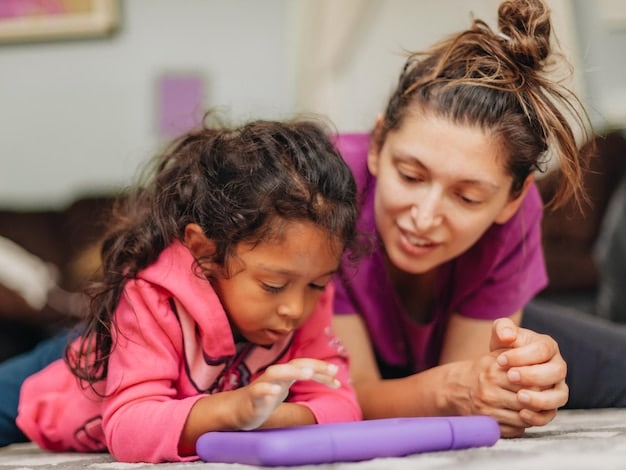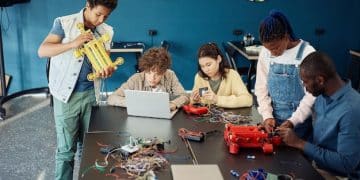The Latest Research on Early Childhood Education: Key Findings & Impact

The latest research on early childhood education emphasizes the importance of play-based learning, personalized approaches, and the integration of technology to foster cognitive, social, and emotional development in young children.
The landscape of early childhood education is constantly evolving, driven by new research and insights into how young children learn and develop. The latest research on early childhood education: Key findings and practical implications are transforming approaches to teaching and care, shaping the future of our youngest learners.
Key Findings in Early Childhood Education Research
Recent studies have shed light on several crucial aspects of early childhood education, offering valuable insights for educators and caregivers. This research spans various areas, from the impact of early interventions to the role of technology in learning.
The Importance of Social-Emotional Learning
Research consistently highlights the significance of social-emotional learning (SEL) in early childhood. SEL encompasses the development of skills such as self-awareness, self-regulation, social awareness, relationship skills, and responsible decision-making.
- Enhanced Academic Performance: Studies show that children with strong SEL skills tend to perform better academically.
- Improved Behavior: Social-emotional competence is linked to decreased behavioral problems in the classroom.
- Long-Term Success: Early SEL skills are predictive of positive outcomes in adulthood, including career success and healthy relationships.

The Role of Play-Based Learning
Play-based learning has emerged as a powerful method for promoting holistic development in young children. This approach emphasizes learning through exploration, experimentation, and social interaction.
Play-based learning encourages children to engage in activities they enjoy, fostering intrinsic motivation and a love for learning. It allows them to develop critical thinking skills, problem-solving abilities, and creativity in a fun and engaging way.
In conclusion, key findings in early childhood education research underscore the importance of social-emotional learning and play-based approaches in fostering holistic development in young children.
Practical Implications for Educators
The latest research in early childhood education offers practical guidance for educators seeking to enhance their teaching practices. By incorporating evidence-based strategies and adapting their approaches, educators can create more effective and engaging learning environments.
Creating a Supportive Classroom Environment
A supportive classroom environment is crucial for children’s social-emotional development and academic success. Educators can create such an environment by fostering positive relationships with students, promoting inclusivity, and providing opportunities for collaboration.
Establishing clear expectations and routines helps children feel safe and secure. Educators should also be responsive to students’ individual needs and provide support and encouragement as needed.

Implementing Play-Based Activities
Integrating play-based activities into the curriculum can enhance children’s learning experiences and promote deeper understanding. Educators can incorporate various types of play, such as dramatic play, construction play, and outdoor play.
- Dramatic Play: Encourages children to develop social skills, empathy, and problem-solving abilities.
- Construction Play: Promotes spatial reasoning, fine motor skills, and creativity.
- Outdoor Play: Supports physical health, gross motor skills, and connection with nature.
In summary, practical implications for educators involve creating supportive classroom environments and implementing play-based activities to enhance children’s learning experiences and promote holistic development.
The Impact of Technology in Early Learning
Technology is increasingly becoming an integral part of early learning experiences, offering new opportunities for engagement and personalized instruction. However, it is crucial to use technology thoughtfully and purposefully.
Integrating technology effectively requires careful consideration of age-appropriateness, educational value, and potential risks. The key is to strike a balance between screen time and other essential activities, such as outdoor play and social interaction.
By thoughtfully incorporating technology, educators can enhance learning experiences and prepare children for a digital world.
Addressing Achievement Gaps Early On
Early childhood education plays a vital role in addressing achievement gaps and ensuring equitable opportunities for all children. Research shows that high-quality early learning experiences can help mitigate the effects of poverty and other adverse circumstances.
Targeted Interventions
Targeted interventions can provide additional support to children who are at risk of falling behind. These interventions may include early literacy programs, language development activities, and social-emotional support.
By addressing achievement gaps early on, we can create a more equitable and just society, where all children have the opportunity to thrive.
The Importance of Early Literacy Development
Early literacy development is a critical foundation for future academic success. Research demonstrates that children who develop strong literacy skills in early childhood are more likely to succeed in school and beyond.
- Reading Aloud: Reading aloud to children is a powerful way to expose them to language, vocabulary, and story structure.
- Phonological Awareness: Activities that develop phonological awareness, such as rhyming and segmenting sounds, are essential for learning to read.
- Print Awareness: Helping children understand the relationship between print and spoken language is crucial for literacy development.
In sum, the importance of early literacy development cannot be overstated, as it lays the foundation for future academic success.
Parental Involvement in Early Education
Parental involvement is a key factor in children’s early learning success. Research consistently shows that children whose parents are actively involved in their education tend to perform better academically and have greater social-emotional well-being.
Strategies for Engaging Parents
There are many strategies that educators can use to engage parents in their children’s education. These include regular communication, home visits, and parent-teacher conferences.
Educators can also provide parents with resources and training to support their children’s learning at home. By working together, educators and parents can create a strong foundation for children’s future success.
Future Directions in Early Childhood Education Research
The field of early childhood education is constantly evolving, and future research will continue to shape our understanding of how young children learn and develop. Some promising areas of future research include:
Further research is needed to understand the most effective ways to support children’s development and prepare them for future success. By investing in early childhood education research, we can create brighter futures for all children.
| Key Point | Brief Description |
|---|---|
| 🌱 Social-Emotional Learning | Focuses on developing self-awareness, empathy, and relationship skills. |
| 🎨 Play-Based Learning | Emphasizes learning through exploration, experimentation, and social interaction. |
| 💻 Technology Integration | Incorporates technology thoughtfully for engagement and personalized instruction. |
| 👪 Parental Involvement | Highlights the importance of parents’ active role in children’s education. |
Frequently Asked Questions
▼
Social-emotional learning (SEL) involves developing skills like self-awareness, self-regulation, social awareness, relationship skills, and responsible decision-making in children. It’s vital for their overall development.
▼
Play-based learning fosters critical thinking, problem-solving, and creativity through exploration and social interaction. It motivates children to learn and helps them develop essential skills playfully.
▼
Technology should be used purposefully, considering age-appropriateness and educational value. Balancing screen time with other activities like outdoor play is essential for holistic child development.
▼
Parental involvement significantly impacts children’s academic and social-emotional well-being. Active parental participation supports children’s learning and enhances their overall development positively.
▼
Early childhood education helps mitigate the effects of poverty and provides equitable opportunities through high-quality learning experiences and targeted interventions. This ensures every child can thrive and succeed.
Conclusion
The latest research on early childhood education emphasizes the importance of creating supportive, engaging, and equitable learning environments for young children. By incorporating evidence-based strategies and staying informed about new developments, educators and caregivers can help children reach their full potential and build a strong foundation for future success.





